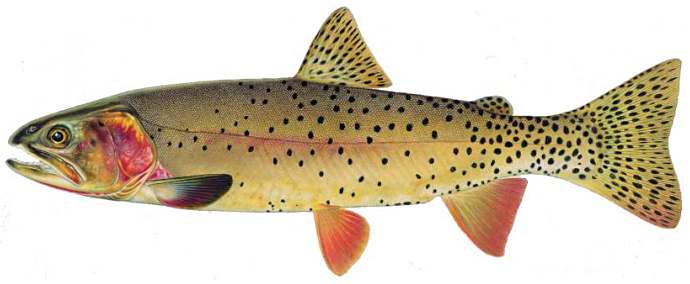SAME SPECIES - DIFFERENT FISH
Different Parking Places
similar tastes
 |
| A NOSE IN THE AIR - SOFT & EASY TAKE |
-------
.. Just knowing what it is that your fishing for is not necessarily enough to get the job done... Fishing where the fish are parked helps some. To state the obvious; lake-run fish are generally larger than resident fish and seek out more secure parking spaces. These are usually deeper, darker, and sneakier.
.. To state the less obvious; the invading fish displace resident fish and a domino-effect takes place; (known as trophic displacement.) This musical chairs phenomenon works for many fish in any given segment of the river. The ultimate result is that some large resident fish are stuck with less secure hides, and the runts are scattered to hides you wouldn't normally target.
.. Parking places for displaced fish need not be spatially very far from their old parking space. In fact they are usually close. This situation is currently exacerbated by the low water and slow flow conditions of the rivers on the west side of Yellowstone National Park. There are few good parking places for any size fish right now.
.. In practical terms this means that runts can be in the same fly-presentation zone as the newly arrived interlopers.
 |
| 3 peas in a hide, (click for large view.) |
.. In the photo on the right three runts, (8" - 10",) share the insecure shelter of a single small boulder. They feed and return to the same place because other parking places are taken by larger fish.
.. This phenomenon can be either a happy or sad situation for fishers. The question is often posed: "why aint I catching the big fish?"
 |
| Everyone want a caddis fly. |
.. Mega-swirls occur on the surface as more than one of them attack the same morsel of flotsam that passes overhead.
.. The fish pictured are in about 14" of water, and only just 4' from the bank. We found them while looking for smaller fry that are usually parked in this parking spot. The fry are nowhere to be seen.
.. Frequently, because of proximity, the large fish and the runts will attack the same bit of supposed food. The larger fish do not, (REPEAT: Do Not,) always win.
.. If your presentation and fly are appropriately deceiving it might behoove you to fish the same parking spot repeatedly if the fish you have just taken seems under-fit to the location. Little fish will often attack large flies and even giant streamers. This is particularly true right now as many have been displaced and the fall feeding imperative is still strong.
.. By keeping in mind that the river is a different place during the run you should increase your chances of catching - all other things being equal, (which they never are.) Of course parking places can be hard to find and even big fish are occasionally found in shallow water.
 |
| A large fish in 10" of water; just two feet from the bank. |
-------
 |
| A caddis swarm - where's the fish? |
.. The Firehole River is hitting spike temperatures around 72° right now and mid day fishing is neither too successful nor desirable.
.. Both rivers are running very low and it is important to seek the darkest water and shady banks for chances to catch fish in any numbers.
.. As the days get shorter the prime caddis time is subsequently shorter as well. Nymphs and emergers can be successful from about 3:30 PM until the flies are on the water and in the air. From 5:00 PM until dark, (about 7:45 or so,) match the hatch. These guys are on the small side and a size 14 or 16 is not too small.
 .. The hoppers are fewer than just a couple of days ago, but still active. This is the perfect time to present a hopper/dropper to the residents.
.. The hoppers are fewer than just a couple of days ago, but still active. This is the perfect time to present a hopper/dropper to the residents... If you'd like a chance at both large and small fish, (we hate surprises,) drown both of them and fish on a slow swing with a fast sink tip line. Lift firmly but not too rapidly when you feel the tug. Flying fish are a distinct possibility with this combination and elbow-jerk reflexes.
.. Reports are sparse from the meadow section of the Gibbon River. One cell phone photo from the narrow section around Tuff Cliff does verify that the runners have penetrated past the junction pool and are present at least that far up the river. A report of two weeks ago of a runner in the plunge pool of the falls is the only other instance of an early arrival and deep penetration.
-------
 |
| Just a pleasant afternoon in Yellowstone National Park. |




.jpg)




